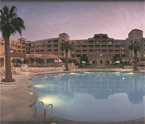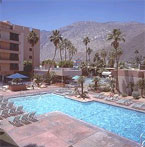Ninth National Indian Nations: Justice for Victims of Crime Conference
|
|
| Home | Pre-Conference Institutes | Agenda | Event Highlights | Registration & Fees | Scholarships | Hotel and Airlines | Contact Us |
HomeThe Office for Victims of Crime (OVC), Office of Justice Programs, within the U.S. Department of Justice is pleased to announce the 9th National Indian Nations: Justice for Victims of Crime Conference. The Conference will be held December 9 — 11, 2004, in Palm Springs California, with the theme, “Reviving our Sacred Legacy: Lighting the Path to our Future.” This year’s conference is coordinated again by the Tribal Law and Policy Institute under a grant from OVC.
The purpose of the 9th National Indian Nations Conference — the largest U.S. Department of Justice sponsored Indian Nations conference — is to bring together Native American victims, victim advocates, tribal leaders, victim service providers, community volunteers, prosecutors, judicial and law enforcement personnel, family violence and sexual assault specialists, medical providers, social services and mental health personnel, probation/corrections, criminal justice and juvenile justice personnel, as well as federal and state agency representatives to share their knowledge, experiences and ideas for developing programs that serve the unique needs of crime victims in Indian Country. Conference Goals
Office for Victims of CrimeThe Office for Victims of Crime was established by the Victims of Crime Act of 1984 (VOCA) to serve as the federal government’s chief advocate for America’s crime victims. OVC administers many formula and discretionary grants for programs designed to benefit crime victims, provides training for diverse professionals who work with crime victims, and develops projects to enhance victim’s rights and services. OVC is committed to enhancing the Nation's capacity to assist crime victims and to providing leadership in changing attitudes, policies, and practices to promote justice and healing for all victims of crime. OVC works with national, international, state, military, and tribal victim assistance and criminal justice agencies, as well as other professional organizations, to promote fundamental rights and comprehensive services for crime victims. OVC is committed to:
Tribal Law and Policy InstituteThe Tribal Law and Policy Institute (the Institute) is an Indian owned and operated non-profit corporation organized to design and deliver education, research, training, and technical assistance programs which promote the improvement of justice in Indian country and the health, well-being, and culture of Native peoples. The Institute focuses upon collaborative programs that provide critical resources for tribal court systems, victims assistance programs, and others involved in promoting the improvement of justice in Indian country. The Institute seeks to facilitate the sharing of resources so that Indian Nations and tribal justice systems have access to resources that they can adapt to meet the individual needs of their communities. The Tribal Law and Policy Institute established the Tribal Court Clearinghouse as a public service in 1997. The Clearinghouse was the first web site devoted to providing information to people working in Native American tribal justice systems, including victim advocates. The Tribal Court Clearinghouse is designed as a resource for tribal justice systems and others involved in the enhancement of justice in Indian country. The Tribal Court Clearinghouse strives to (1) provide extensive information and resources concerning tribal justice and other issues related to the enhancement of justice in Indian country directly on the Clearinghouse; (2) provide descriptive links to additional resources which will facilitate tribal justice utilization of technological innovations and the vast information available on the Internet; and (3) foster and encourage the exchange of ideas and expertise between people working in tribal justice systems. Conference Organizational Co-Sponsors
Conference Agency Co-Sponsors
Conference Contributing Co-Sponsors
|
Click on the image to visit a visitor information web site.Fees | Scholarships | Hotel & Airlines | Contact Us
This conference and conference web site are funded under grant 2003-VR-GX-0022 from the Office for Victims of Crime, Office of Justice Programs, United States Department of Justice. Site created and maintained by the Tribal Law and Policy Institute, Inc.











